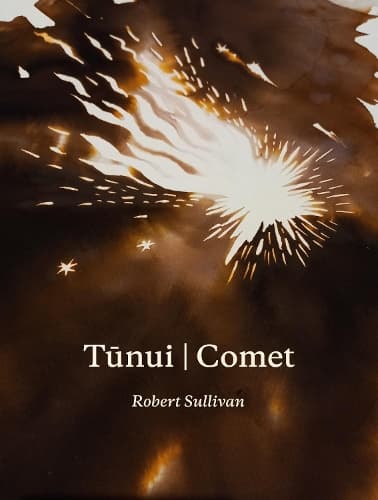Review: Tūnui/Comet
Reviewed by David Eggleton
Charged and shamanistic, alive with detail, with colonial bric-a-brac, with Māori renaissance bits and bobs, with elegiac verses on tapu and spiritual places, with ruminative riffs on cultural and political responsibilities, Tūnui/Comet, Robert Sullivan's first new poetry collection in ten years, is a significant publishing event.
Here, Sullivan's poems are song lines, in which his whakapapa, as ghosts and spirits and ancestors, stride out with him in a kind of playful hikoi, a land march north to south, touchstone to touchstone, while a comet crosses the sky like a revenant of the 19th century prophet Papahurihia, one of Sullivan's tūpuna. Journeying from the 'surges' of Auckland's Great North Road to Oamaru, 'the Steampunk Capital,’ his poems seek to encompass both past and present Aotearoa and unite them in a continuum: “I took the bloody hook/ and said my business to the ocean...” (Māui's Mission) ... “Smile in your cars and honk honk honk/ on the Great North Road” (Hello Great North Road).
This is a collection that draws on the techniques and skills of Māori oratory as well as wide knowledge of the canonical traditions of English-language poetry. Various poems evoke traditional rituals and ceremonies and prayers and blessings, while The Declaration of Independence, dedicated to Moana Jackson, states that the original signing of 'Te Tiriti' was “an assertion of mana...with our nose moko as signatures.”
The book connects specifically with the traditions of the poetry of Aotearoa New Zealand in a number of ways, most obviously through homages to poets such as Alistair Te Ariki Campbell, Keri Hulme and Hone Tuwhare, except that these invocations to literary ancestors are not so much homages as affirmations of affinity and connection: “I'd been down at Moeraki attempting to see the same/ midges and kelp as Keri Hulme...” (Decolonising the Coastline).
Robert Sullivan's poems navigate by portents, and by the stars, to thrill and inspire us.
In the poem sequence Decolonization Wiki Entries, the poet considers his own European settler forebears as part of the Imperialist narrative and then as the poem sequence develops, it digs for factual evidence as if conducting an archeological survey. Thus Ruapekapeka, dream-like, uncovers “bunkers and trenches ... buried knives.” This poem suggests the healing of colonial trauma might take the form of planting 'carvings' and 'flowers.’ Other poems consider the role of the Bible in conquest, along with a quirky depiction of how the poet himself might come to terms with being a product of colonisation and how through 'training' reminiscent of Catholic or Christian self-abjection, he “will be ready to learn about the Treaty.”
Such poems acknowledge that New Zealand's history is a process of constant recalibration as complicated facets of the past come into view. In the poem Ah, Captain Cook is not denounced as the savage coloniser but rather perceived as someone who left a benign legacy of culturally-entangled useful artefacts, even as the land maintains its self-possession: “The beaches/ lined the coasts/ as they always had...”. Captain Cook becomes a kind of shape-shifter as a subject of obsessive interest for this poet, shown also in his earlier collections of poetry. Cook, then, is a symbolic ancestor figure who can be mined and mined again like a seam of precious ore, as in Cooking with Gas or Reading List: “I never wrote about his childhood before.”
Sullivan's lyrical Old Government House finds that the Auckland heritage building is a useful colonial relic. It offers an architectural structure ripe for symbolic redress in the manner of a Christo sculpture: "I want to wrap Old Government House in pages of the Treaty ... in lavalavas ... in fine feather cloaks ... in tartans.”
Nominalism, naming and describing the world in Aotearoa's other official language is about acknowledging inherent frictions, conflicts, but for Sullivan it's also about seeking the resolution and harmony of cultural tensions through the power of poems. His Te Whitianga a Kupe poem sequence celebrates various forms of 'waka,’ and he uses the the craftwork involved in making these vessels to emphasise integrity and authenticity. It's as if the poet's various iterations of the 'waka' beat ceaselessly against the currents of neo-colonial globalisation, are borne back into the mythological past and then refreshed, move forward again as to a rhythmic chant. Robert Sullivan's poems navigate by portents, and by the stars, to thrill and inspire us.
Reviewed by David Eggleton
